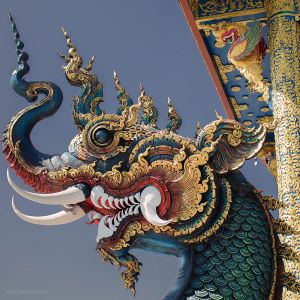Mahaparinirvana, Mahāparinirvāṇa: 5 definitions
[«previous (M) next»] — Mahaparinirvana in India history glossary
Source: Cologne Digital Sanskrit Dictionaries: Indian Epigraphical Glossary
Mahāparinirvāṇa.—(CII 4), the passing away of the Buddha. Note: mahāparinirvāṇa is defined in the “Indian epigraphical glossary” as it can be found on ancient inscriptions commonly written in Sanskrit, Prakrit or Dravidian languages.
Sanskrit dictionary
[«previous (M) next»] — Mahaparinirvana in Sanskrit glossary
Source: Cologne Digital Sanskrit Dictionaries: Edgerton Buddhist Hybrid Sanskrit Dictionary
Mahāparinirvāṇa (महापरिनिर्वाण) or Parinirvāṇa or Parinirvāṇa-sūtra or Mahāparinirvāṇa-sūtra.—: Karmavibhaṅga (and Karmavibhaṅgopadeśa) 156.15.
--- OR ---
Mahāparinirvāṇa (महापरिनिर्वाण).—nt., Mahāvyutpatti 1370; Karmavibhaṅga (and Karmavibhaṅgopadeśa) 159.12; °ṇa-sūtra, Karmavibhaṅga (and Karmavibhaṅgopadeśa) 158.2; 159.2; name of a work (also Parinirvāṇa-sūtra; = Pali Mahāparinibbāna-sutta, Dīghanikāya (Pali) sūtra 16). See Waldschmidt, NGGW, ph.-h. Kl., Fachgr. III, NF II Nr. 3 (1939); AbhGGW, ph.-h. Kl., 3te Folge, Nr. 29, 30 (1944, 1948); Abh. AW Berlin. ph.-h. Kl., 1949, Nr. 1 (1950).
Source: Cologne Digital Sanskrit Dictionaries: Monier-Williams Sanskrit-English Dictionary Mahāparinirvāṇa (महापरिनिर्वाण):—[=mahā-parinirvāṇa] [from mahā > mah] n. Name of a Buddhist Sūtra.
[[[Sanskrit]] to German] Mahaparinirvana in German
context information Sanskrit, also spelled संस्कृतम् (saṃskṛtam), is an ancient language of India commonly seen as the grandmother of the Indo-European language family (even English!). Closely allied with Prakrit and Pali, Sanskrit is more exhaustive in both grammar and terms and has the most extensive collection of literature in the world, greatly surpassing its sister-languages Greek and Latin.
Discover the meaning of mahaparinirvana in the context of Sanskrit from relevant books on Exotic India
See also (Relevant definitions) Partial matches: Maha, Parinirvana.
Starts with: Mahaparinirvanasutra.
Full-text (+1): Mahaparinirvanasutra, Maha Parinibbana Sutta, Parinirvana, Parinirvanasutra, Nirvanangulimalika, Papa, Kushinagara, Nirvana-caitya, First Buddhist Council, Nanakarana, Mathura, Pava, Seven Title Classification, Atuma, Kushinagari, Alara Kalama, Arada Kalama, Putkasa, Aduma, Kashyapa.
Relevant text
Search found 14 books and stories containing Mahaparinirvana, Mahāparinirvāṇa, Maha-parinirvana, Mahā-parinirvāṇa; (plurals include: Mahaparinirvanas, Mahāparinirvāṇas, parinirvanas, parinirvāṇas). You can also click to the full overview containing English textual excerpts. Below are direct links for the most relevant articles:
Mahayana Mahaparinirvana Sutra
Chapter VI - On the Virtue of the Name < [Section One]
Chapter XXXI - On Bodhisattva Highly-virtuous King (e) < [Section Six]
+ 19 more chapters / show preview
The 6th Patriarch Platform Sutra
Chapter VIII - The Sudden School and the Gradual School
Chapter I - Autobiography
Chapter VII - Temperament and Circumstances
show preview
The Indian Buddhist Iconography (by Benoytosh Bhattachacharyya)
Figure 7 - Stūpas of Nepal (2): Bauddh (Bodhnāth)
Figure 8 - Stūpas of Nepal (3): Kāthe Simbhū
Figure 6 - Stūpas of Nepal (1): Simbhū
show preview
Mahayana Buddhism and Early Advaita Vedanta (Study) (by Asokan N.)
Chapter 3.1 - The Mandukya-karika or Gaudapadiya-karika
Introduction
show preview
Maha Prajnaparamita Sastra (by Gelongma Karma Migme Chödrön)
Understanding dharmatā: Preliminary note < [Part 2 - Understanding dharmatā and its synonyms]
I. Gaze like that of the elephant (nāgāvalokita) < [Part 10 - Looking in the manner of the elephant, etc.]
Appendix 2 - Lokāntarikā (intermediate spaces between two worlds) < [[[Chapter]] XLVII - Praises made by the Buddhas]
+ 14 more chapters / show preview
The Fo-Sho-Hing-Tsan-King (A Life of Buddha) (by Samuel Beal)
History of Bodhisattva Aśvaghoṣa
Appendix III - Mahāparinirvāṇa-sūtra (translated by Dharmarakṣa)
Varga 26. Mahāparinirvāṇa < [Kiouen V]
Source
[[1]]
